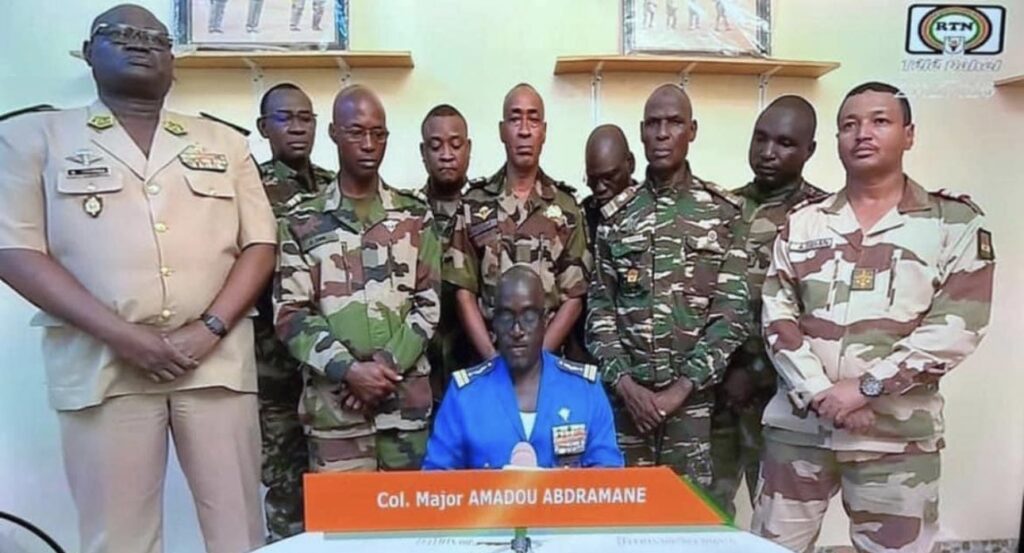The coup in Niger will undermine the fight against resurgent terror groups in Africa’s Sahel region, France’s defence minister said this week, accusing the country’s junta of taking “hostage” not just President Mohamed Bazoum but the entire country.
Speaking in an interview with AFP, French Armed Forces Minister Sebastien Lecornu praised the “strong” actions of regional West African group ECOWAS, which has given the junta until Sunday to restore democratic rule or face the threat of military action.
The coup against Bazoum has infuriated France, which has 1,500 troops deployed in the country and was using Niger as a hub for anti-terror operations in the region, after successive coups the last two years in Mali and then Burkina Faso prompted pullouts from those countries.
Paris has made clear it still regards Bazoum, who is currently held as the presidential residence in Niamey, as Niger’s sole legitimate leader.
Lecornu echoed comments by other Western officials and observers that the coup had come at a precarious moment when several terror Islamist terror groups including Boko Haram, Islamic State in the Greater Sahara (ISGS) and Al-Qaeda’s local branch were regaining strength.
“Not only has President Bazoum been taken hostage but also the population of Niger,” Lecornu told AFP in the interview.
“This putsch will weaken the fight against terrorism in the Sahel, where activity by armed terrorist groups is resurging, notably taking advantage of certain failed states like Mali.”
“It’s an error of judgement that goes totally against the interests of the country,” he added.
‘Catastrophic Consequences’
The French foreign ministry said earlier on Saturday it “firmly” supported the efforts of ECOWAS (the Economic Community of West African States) to reverse the coup and Lecornu said on the eve of the passing of the deadline that the 15-nation bloc was showing its stature.
“More generally, we see that ECOWAS is shouldering its responsibilities in the management of this crisis in Niger, taking strong positions in favour of respect for international law and respect for democratic processes.”
“This is an important milestone that must be welcomed and supported,” he said.
Lecornu said there was no indication of involvement in the coup by Russian mercenary group Wagner, which Western governments say is bolstering the regimes in both Burkina Faso and Mali.
But he warned Niger risked going down the same path as its neighbours.
“Wagner is not behind this coup. But it is possible that, opportunistically, Wagner can seek to help this junta as it tries to establish itself.”
He warned that calling on Wagner would have “catastrophic consequences” for Niger.
“Look at the Malian situation after the departure of the French forces: … 40 percent of Malian territory is out of the control of the Malian state. It is a failure. Many ECOWAS actors are aware of this.”
‘Personal dispute’
As debate rages in France over whether the sudden coup on July 26 led by General Abdourahamane Tiani, the head of Niger’s presidential guard, was a major intelligence failure by the French foreign intelligence service, the DGSE, Lecornu said that Paris had been aware that Bazoum’s position was “fragile”.
But he said what may have surprised was that the coup stemmed above all from a “personal dispute”.
People close to Bazoum had told AFP he recently said he wanted to replace Tiani as the head of his guard.
Lecornu, meanwhile, sought to play down the extent of anti-French sentiment in Niger, despite protests outside the French embassy in Niamey which saw signs torn down and windows smashed.
“Some well-known groups carry out information campaigns against us but we must remain calm and look objectively at the facts.”
“Three Russian flags waved in front of the French embassy, daubed with a few slogans, should neither intimidate us nor push us to hasty conclusions, as is happening too easily with some people,” he said.

